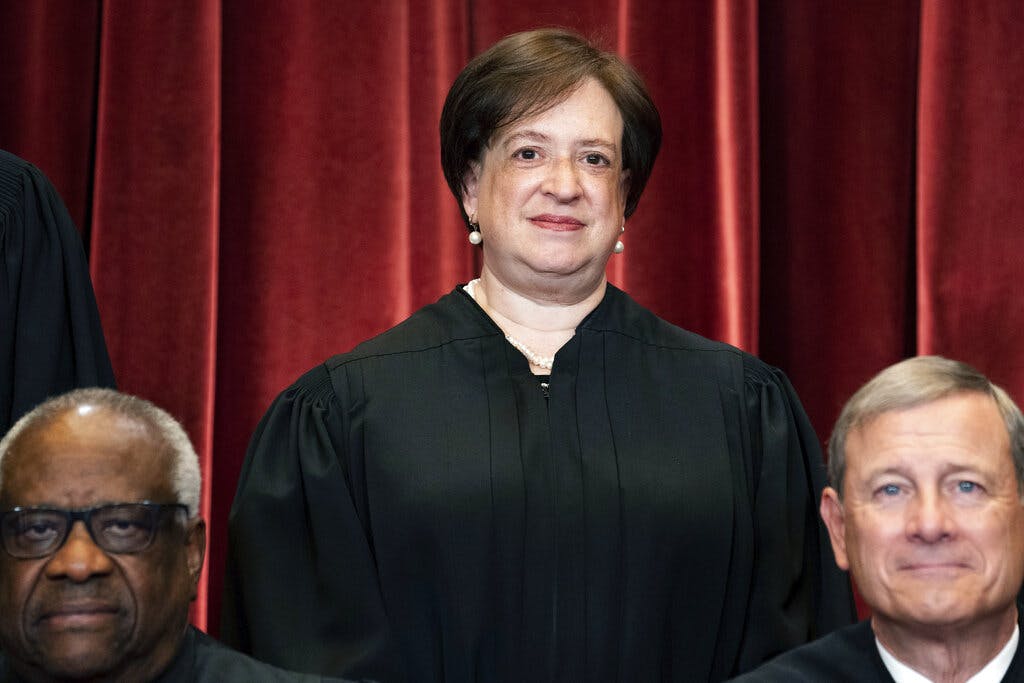Supreme Court Seems Skeptical of Trump’s Challenge to Nationwide Injunctions in Birthright Citizenship Cases
Under questioning from Justice Barrett, the solicitor general refuses to say if the government would respect a circuit court opinion on the issue.

The Supreme Court seems prepared to turn down President Trump’s claims that federal district court judges have no power to issue nationwide injunctions striking down his executive actions, such as abolishing birthright citizenship for the children of illegal aliens.
The government lawyer charged with making the argument on behalf of the president, Solicitor General John Sauer, was grilled by even the Trump-appointed justices during oral arguments on Thursday.
The case before the court now deals with Mr. Trump’s executive order declaring that birthright citizenship is not a right enjoyed by those born here to illegal alien parents. After a federal district court judge placed a nationwide stay on that order, the government is now asking the Supreme Court to restrict lower court jurists’ powers.
The justices seemed concerned Thursday that the government’s demands are unworkable, given the sheer number of cases that the Supreme Court would have to deal with if district court judges are unable to identify broad classes of individuals worthy of relief.
Justice Elena Kagan seemed shocked at certain points during oral arguments, wondering aloud how individuals challenging Mr. Trump’s order could get relief if nationwide injunctions were somehow no longer allowed. Given how many people have already been protected from the order by these injunctions, Justice Kagan wondered how such cases would even get to the Supreme Court so that the justices could set nationwide standards, as the government is asking them to do if such cases ever reach their chambers.
“You’re losing a bunch of cases,” Justice Kagan pointed out. “Why would you ever take this case to us? … It’s up to you whether to take this case to us.” She notes that if a plaintiff wins in challenging an executive order, then under Mr. Sauer’s preferred scheme that one individual would win protections from lower courts, only to have all others in the same circumstances go without the right of birthright citizenship.
“You’d need somebody to lose, but nobody’s going to lose in this case,” the justice declared from the bench. “The ones who can’t afford to go to court, they’re the ones who are going to lose.”
“It’s losing a lot of individual cases, which still allow it to enforce its E.O. against the vast majority of people to whom it applies,” she said.
Justice Neil Gorsuch seemed to be in line with Justice Kagan’s reasoning and line of questioning. After Justice Kagan was done speaking, Chief Justice Roberts turned to Justice Gorsuch to see if he had any questions. Justice Gorsuch then said, “Well, Justice Kagan asked my questions better than I could,” prompting the audience to laugh.
One of the more astounding moments of the hearing was when Mr. Sauer told Justice Amy Coney Barrett that the government may not abide by lower court orders related to these executive orders. Justice Barrett posed a hypothetical about the administration respecting a circuit court ruling — in this case, the Second Circuit Court of Appeals — which declared the birthright citizenship order unconstitutional.
“Did I understand you correctly to tell Justice Kagan that the government wanted to reserve its right to maybe not follow a Second Circuit precedent … because you might disagree with the opinion?” the justice asked Mr. Sauer.
“Our general practice is to respect those precedents, but there are circumstances when it is not a categorical practice,” he responded.
“This administration’s practice, or the longstanding practice of the federal government? And I’m not talking about in the Fourth Circuit. … I’m talking about within the Second Circuit,” she shot back quickly.
Mr. Sauer then said again that the Department of Justice will “generally” respect those decisions, though clearly left open the door to possibly ignoring them.
Justice Sonia Sotomayor said Mr. Sauer’s demand that nationwide injunctions be restricted would have severe consequences for all constitutional rights. She posed the hypothetical that, under the government’s preferred scheme, a president would be allowed to confiscate all firearms in the country without any due process, which would then require tens of millions of Americans to come to the Supreme Court to demand their individual relief.
Justice Brett Kavanaugh seemed to have his own issues with the practicality of enforcing Mr. Trump’s order restricting the right of birthright citizenship. The government was due to spend 30 days devising a new policy scheme to ensure the children of illegal aliens are not granted citizenship, though a lower court injunction stopped it from even beginning the policymaking process. Mr. Sauer had no answers for Justice Kavanaugh when he was pressed about how exactly this would work.
“What do hospitals do with a newborn? What do states do with a newborn?” Justice Kavanaugh asked. Mr. Sauer responded saying that hospitals should not do anything different, but rather it was up to federal authorities to verify the child’s status and the immigration status of the parents.
“How are they gonna know that?” the justice asked. When Mr. Sauer said the federal officials will simply “figure that out” in the coming weeks, Justice Kavanaugh pushed again, asking: “How?”
“We don’t know,” Mr. Sauer eventually conceded.

